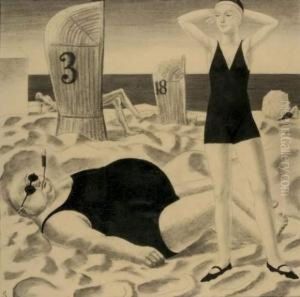Erich Schilling Paintings
Erich Schilling was a German artist known for his contributions to graphic design and illustration. Born on July 28, 1905, in Nuremberg, Germany, Schilling grew up in a period of significant artistic and cultural change. He developed an interest in art at a young age and pursued his passion through formal education in the arts.
During his career, Schilling became recognized for his distinctive style, which often incorporated elements of the New Objectivity movement and Art Deco. He worked on a variety of projects, including poster designs, book illustrations, and commercial graphics. His work was characterized by clean lines, bold colors, and a clear and direct visual language that was both modern and accessible.
Schilling's contributions extended beyond his own creations. He was also involved in art education, teaching at various institutions and influencing a new generation of graphic designers and illustrators. Throughout the 1930s and 1940s, he navigated the challenges of working as an artist in Germany, adapting to the shifting political landscape and the constraints it imposed on artistic expression.
Despite the tumultuous times, Schilling continued to work until his later years. His legacy includes not only his own body of work but also the impact he had on his students and the field of graphic design in Germany. Erich Schilling passed away on March 19, 1984. His work remains a testament to his skill and the artistic movements that shaped his career.


